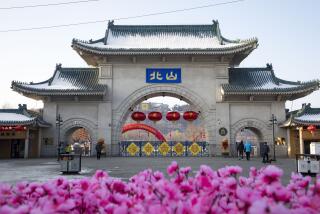China Syndrome
- Share via
What began as a Christmas Eve clash between African students and Chinese gatekeepers outside a dormitory at Nanjing’s Hehai University now threatens to become an international embarrassment for China. Student demonstrations, many with anti-black overtones, have spread to three other cities. African diplomats have registered formal protests and threatened to recall their students. And the Organization of African Unity has demanded an investigation of allegations that Nanjing police tortured some African students with electric cattle prods.
At this distance it is impossible to sort out the accuracy of the charges and countercharges about the obvious racial tensions between the 1,500 African exchange students in China and their hosts. For foreign correspondents in China the task of reporting the breaking story has been complicated by the government’s refusal to let reporters, including David Holley of The Times, interview the supposed instigators of the Nanjing incident. But it is clear that the efforts of university authorities and local policemen in Nanjing to calm the situation are inadequate; African students there have returned to their dormitories but say that they still fear for their safety. Now that clashes between African students and their Chinese classmates also have been reported in Beijing, Wuhan and Hangzhou, the central authorities should step in and launch a full investigation.
Intervention by top officials often has been needed to cut through China’s legendary red tape and solve local problems. Deng Xiaoping personally has interceded, for example, to approve marriages between Chinese and foreigners and to settle other disputes that are deemed too hot to handle by local bureaucrats. Such intervention has become essential now that diplomatic protests have called China’s standing in the Third World into question.
Investigators need to consider simple matters of fact, like whether African students who allegedly attacked the Hehai gatekeepers and dismantled a wall under construction around their dormitory violated the law, infringed campus rules and destroyed university property. Discipline may be in order for some of these students, as well as for the Chinese students who reportedly broke into the foreign students’ dormitory and ransacked the Africans’ rooms.
But some broader soul-searching also is needed. Because China traditionally has been so supportive of the world’s other poor nations, so generous in educating Africa’s brightest students at its own expense, its officials may not be as sensitive as they should to the racism in Chinese society. African students and others with dark skin repeatedly complain that Chinese discriminate against them, spread rumors that they have brought AIDS to China and oppose their attempts to befriend ordinary Chinese, especially young women. Perhaps some of these complaints are fanciful, but not all of them: Foreign correspondents have reported posters saying “Black Devils, Go Home” on several university campuses.
China’s usual treatment of all foreigners--segregate them and give them special privileges to keep them quiet--also bears some inspection. It’s significant that the Africans in Nanjing, some of whom have lived in China for more than five years, were mobilized by the authorities’ attempt to build a wall around their dorm to prevent them from taking Chinese visitors, especially women, to their rooms; China keeps foreigners, whether diplomats or businessmen, behind walls, both literally and figuratively. And the thousands of Chinese students who took to the streets were protesting not simply the Africans’ supposed penchant for parties, loud music and Chinese girlfriends but the superior lodging and food that the authorities provide for all foreign students. African and Chinese students alike have begun to ask questions about officially decreed discrimination; it’s time that the Beijing authorities started asking the same questions.
More to Read
Sign up for Essential California
The most important California stories and recommendations in your inbox every morning.
You may occasionally receive promotional content from the Los Angeles Times.










